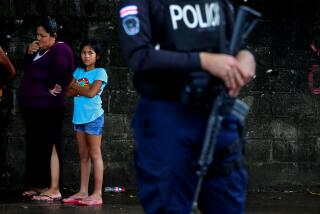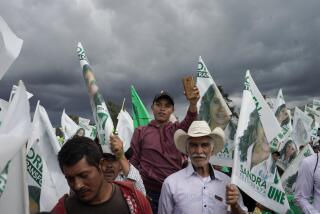Rapes Show Lingering Violence in Guatemala
GUATEMALA CITY â Beautiful scenery, stunning Maya ruins and bargain prices maintained this nationâs reputation as a backpackersâ paradise, a must-see on the college vacation circuit, even during more than three decades of civil war.
But late last week, the rapes and robbery of Maryland university students focused international attention on the postwar violence engulfing this Central American nation and raised questions about how safe it is to travel here.
What is clear from talks with Guatemalans and diplomats is that the assault on the 16 students and faculty members from St. Maryâs College, which occurred about 40 miles southwest of Guatemala City on Friday afternoon, was not an isolated incident. Foreign tourists have increasingly come under attack since last year, warned a report issued in September by the U.S. Embassy here.
Still, the State Department has refrained from issuing a formal travel advisory warning Americans to curtail visits to Guatemala. âWe will do all we can to protect Americans and alert them to problems,â State Department spokesman James P. Rubin said at a Washington news conference Tuesday.
The decision relieved some Guatemalans and disappointed others.
âWe will have less opportunity in the short term to solve this problem,â said David Ruano, a founder of the 4-year-old Neighborhood Guardians, which organizes neighborhood watch programs and provides crime victims with support services. âThe [U.S.] Department of State is covering up the debacle that we have in our country.â
But the Guatemalan Tourism Institute, a government agency, said the effect of a travel advisory would have been devastating for an industry that supports 300,000 families and in 1997 earned Guatemala $325 million, making it the countryâs second-leading industry after coffee. More than 40% of Guatemalaâs 576,362 visitors last year were from the United States, the institute said.
The publicity surrounding the ordeal of the St. Maryâs students, five of whom were raped, is still expected to dampen enthusiasm for visiting Guatemala.
âThe effect will be damaging for the country, but this is a signal of the serious problems that we Guatemalans live with every day,â Ruano said.
He hopes that the incident will force the government to act to halt the increasing numbers of kidnappings, robberies and murders that have victimized Guatemalans. The signing of a peace agreement more than a year ago ended the war but made worse common crime, as soldiers and guerrillas were left without jobs.
âWhile violent crime has been a serious and growing problem in Guatemala for years, 1997 has seen a marked increase in incidents involving American citizens,â the U.S. Embassy reported. It went on to detail three incidents in which six U.S. citizens were raped in July and August 1997.
âWe know that we have a security problem,â said Magda Stella Arceo, spokeswoman for the Guatemalan Tourism Institute. âWe are trying to address it.â
But Guatemalans are divided as to what the solution should be. Last summer, the institute put in effect a program of special security for visitors.
Tour operators call the institute with group itineraries, and tourism police are assigned to patrol the areas to be visited. The institute was not notified of the St. Maryâs College visit, said Arceo.
That is one of the projectâs flaws, said the Guatemalan Tourism Chamber, a private industry group: By singling out tour groups for protection, the project neglects independent groups and tourists traveling alone.
âThe duty of the government is to guarantee the safety of all inhabitants, both citizens and visitors,â said Danina del Valle, chamber manager. âWe want our country to be a safe place for our visitors and for us.â
More to Read
Sign up for Essential California
The most important California stories and recommendations in your inbox every morning.
You may occasionally receive promotional content from the Los Angeles Times.










